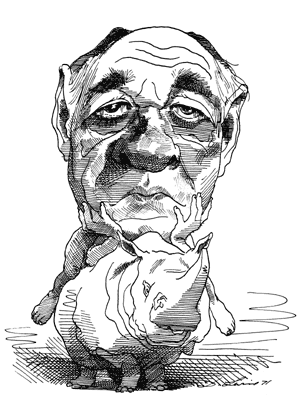In response to:
The Conscience of the Huxleys from the March 25, 1971 issue
To the Editors:
After properly emphasizing “the conscience of the Huxleys,” Stephen Spender (NYR, March 25) offers a sketch of Aldous that vastly oversimplifies that very complex man. By calling him an “evolutionary humanist,” Spender suggests that Aldous took a single, fixed intellectual position, whereas he changed his opinions—even reversed them—in important ways, and was perhaps the most eclectic thinker of our time. The phrase also puts the emphasis on the intellect, and Aldous cannot really be understood in that way: he has to be approached psychologically as well as intellectually. Mr. Spender seems implicitly to agree, for he refers to the “radiant isolation” of the Huxleys, to their “incompleteness of contact or communication” with others. He sees Aldous’s early “diabolism” as “a very thin and papery mask”; he refers to wishful thinking, to unsureness of judgment, to gullibility, to matters of self-regard. Yet instead of relating these elements involving introspection and inner struggle to the wealth of publicly and privately expressed ideas, Mr. Spender separates much of the living man from his views in a way that is neither necessary nor sound.
Mr. Spender’s portrait suffers even more, however, from his neglect of most of Huxley’s books. In drawing conclusions only from the Letters, and treating some of them as final statements, he again does injustice to a complex, changing man. To say that Aldous “came at the end to think of mystical experience as the most important thing in life” ignores Huxley’s own distinction between the “mystical” and the “visionary,” and it turns into a mere conclusion a long and dramatic story, beginning even before Those Barren Leaves in 1925, and ending even after Island in 1962.
It is a half-truth, if that, to say that Huxley “had come to regard” art “as unimportant except as intermediary between the spectator and the…ground of being,” though this would seem a desirable function to have performed. Nor does a single 1940 letter prove that Huxley thought a “complete transformation” of men “was possible only among a few members of an elite.” Other letters make clear Huxley’s debt to William Sheldon, who helped him to reject the earlier idea of an elite. In Island, a book Mr. Spender also unaccountably ignores, children are classified with the help of Sheldon’s system, taught to tolerate the differences of others, then led into different but appropriate spiritual Ways.
All these matters are traced and explored in my Aldous Huxley and the Way to Reality, advertised last November in NYR by Indiana University Press. Since it shows that Mr. Spender’s assessment needs to be modified, it is unfortunate that he ignored it in his essay.
Charles M. Holmes
Professor of English
Transylvania University, Lexington, Ky.
Stephen Spender replies:
In my review I wrote, “Humanism of the evolutionary variety…seems a special preserve in which Huxleys attempt to fill a theological and moral vacuum.” At the same time, I pointed out that it was Julian Huxley who evolved the philosophy of Evolutionary Humanism, and the greater part of my article was devoted to making it clear that the brothers Julian and Aldous held completely different and, within the bounds of fraternal politeness, opposed views. Although his own ideas derived from his original concern with evolution and humanism, Aldous Huxley was not an evolutionary humanist (to have been this would have meant his supporting Julian Huxley’s philosophy), nor did I call him one, so I can only conclude that Professor Holmes, who reproaches me for not having discussed several books which I was not concerned with writing about (the list of those under review was printed above my article), appears not to have read my essay. If he had done so, he would have seen that much of it was taken up with quoting Aldous’s criticism of Evolutionary Humanism, which I myself analyze in the article as a brand of Utilitarianism. Aldous was anything but a Utilitarian.
This Issue
August 12, 1971



